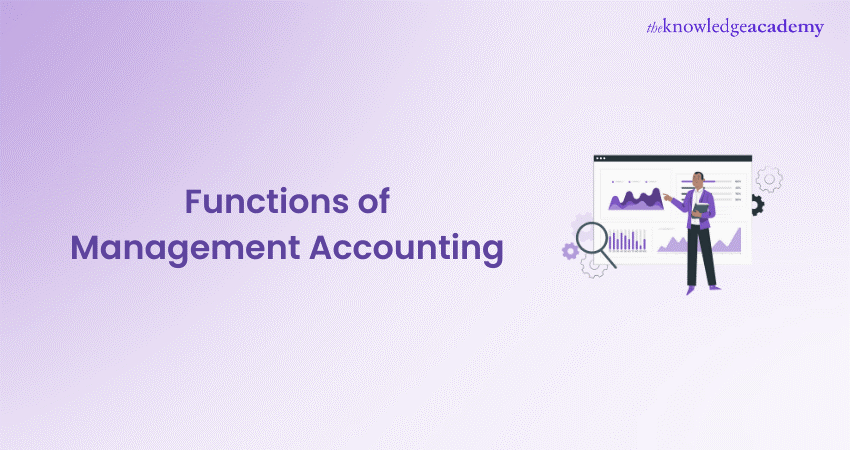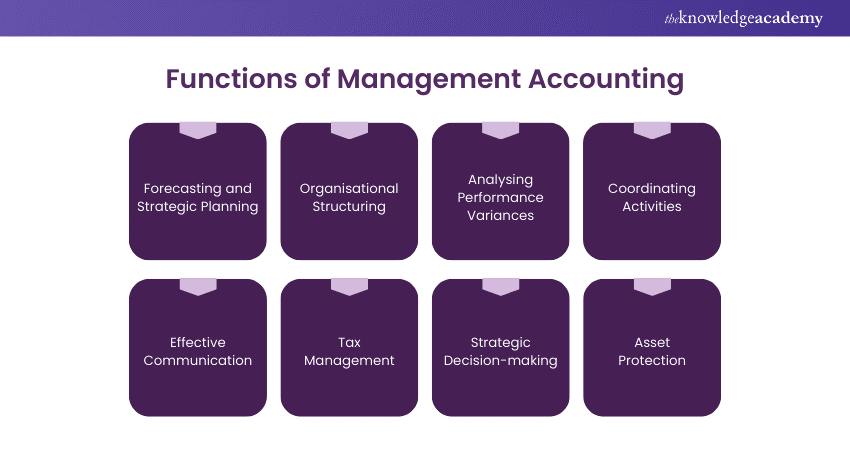We may not have the course you’re looking for. If you enquire or give us a call on + 1-866 272 8822 and speak to our training experts, we may still be able to help with your training requirements.
We ensure quality, budget-alignment, and timely delivery by our expert instructors.

We all understand that managing a business requires careful navigation. From budgeting to strategic planning, the tasks can be overwhelming. This is where the Functions of Management Accounting enter the conversation. But what is management accounting? It's a vital component that aids decision-making and improves business performance.
Effective management accounting transforms raw data into meaningful insights. It helps businesses allocate resources efficiently and monitor progress. This blog will delve into the essential Functions of Management Accounting and its importance in today’s businesses. Join us as we uncover how it supports informed decisions and drives success.
Table of Contents
1) What is Management Accounting?
2) What are the Functions of Management Accounting?
a) Forecasting and Strategic Planning
b) Organisational Structuring
c) Analysing Performance Variances
d) Coordinating Activities
e) Effective Communication
f) Tax Management
g) Strategic Decision-Making
h) Asset Protection
i) Ensuring Accountability
j) Performance Evaluation
3)onclusion
What is Management Accounting?
Management Accounting is a segment of accounting with its own distinct purpose. Similar to Corporate Accounting and Financial Accounting, Management Accounting primarily focuses on providing crucial managerial information for better decision making. It encompasses of both financial data and non-financial data to present to the management. Unlike financial accounting which is presented to the stakeholders of the company, management accounting is predominantly used internally.
What are the Functions of Management Accounting?
The Functions of Management Accounting are diverse, encompassing a range of activities that support the strategic and operational objectives of an organisation. Here’s an overview of the key functions:

1) Forecasting and Strategic Planning
One of the key Functions of Management Accounting is to assist in forecasting future financial performance and strategic planning. By analysing past trends, market conditions, and economic indicators, management accountants can predict future financial outcomes and help the organisation to develop long-term strategies.
This forecasting allows businesses to prepare for potential challenges and opportunities, ensuring that they remain competitive and resilient.
2) Organisational Structuring
Management Accounting plays a critical role in organisational structuring by providing insights into the optimal allocation of resources. It helps in determining the most efficient ways to structure the organisation, whether through decentralisation, centralisation, or a hybrid approach.
By analysing financial data, management accountants can recommend structural changes that enhance efficiency, reduce costs, and improve overall performance.
3) Analysing Performance Variances
A significant function of Management Accounting is to analyse performance variances by comparing actual results with budgeted or forecasted figures. This analysis helps identify areas where the organisation is underperforming or exceeding expectations.
By understanding these variances, management can take corrective actions to address inefficiencies or capitalise on strengths, thereby improving overall performance.
4) Coordinating Activities
Management Accounting facilitates the coordination of various activities within the organisation. It ensures that different departments and teams are in accordance with the company's overarching strategic objectives.
By providing relevant financial information and analysis, management accountants help in coordinating efforts across the organisation, ensuring that resources are used effectively and that all sections of the organisation are striving for shared goals.
5) Effective Communication
Efficient communication is crucial for the successful operation of any company. Management Accounting plays a key role in ensuring that relevant financial information is communicated clearly and accurately to all stakeholders.
Whether it’s communicating budgetary constraints, financial performance, or strategic plans, management accountants ensure that the right information is delivered to the right people at the right time.
6) Tax Management
Tax management is another critical function of Management Accounting. By following up on tax laws and regulations, management accountants help organisations to minimise their tax liabilities and ensure compliance with legal requirements.
This function involves not only calculating taxes but also planning and implementing tax strategies that align with the organisation’s financial goals.
7) Strategic Decision-making
Management Accounting provides the financial insights necessary for strategic decision-making. Whether it’s deciding on a new investment, beginning in a different market or introducing a new product, management accountants provide the data and analysis needed to make informed decisions.
By evaluating the potential risks and rewards, they help ensure that the organisation’s strategic decisions are financially sound.
8) Asset Protection
Protecting the organisation’s assets is a key function of Management Accounting. This includes safeguarding physical assets such as property and equipment, along with intangible assets such as intellectual property.
Management accountants implement controls and procedures to protect these assets from theft, loss, or damage, ensuring that they continue to contribute to the organisation’s success.
Decode the language of business with our Accounting Courses. Gain the edge you need to succeed. Register now!
9) Ensuring Accountability
Ensuring accountability within the organisation is a vital function of Management Accounting. By establishing and monitoring financial controls, management accountants help ensure that all employees and departments are accountable for their financial performance.
This accountability is crucial for maintaining transparency and trust among internal members and external partners.
10) Performance Evaluation
Performance evaluation is an ongoing function of Management Accounting. By regularly assessing the performance of departments, teams, and individuals, management accountants help identify areas for improvement and recognise achievements.
This evaluation process is essential for maintaining high standards of performance and for motivating employees to achieve their best.
11) Providing Advisory Services
Management accountants often provide advisory services to other departments and senior management. Their expertise in financial analysis and strategy makes them valuable advisors on a range of issues, from cost reduction to investment planning. By offering sound financial advice, they help guide the organisation towards its strategic objectives.
12) Offering Financial Insights
Providing financial insights is a core function of Management Accounting. By analysing financial data, management accountants can identify trends, opportunities, and potential risks that may not be immediately apparent. These insights are invaluable for guiding the organisation’s strategy and ensuring that it remains on a path to success.
13) Conducting Special Research
From time to time, management accountants are required to conduct special research on specific financial issues or projects. This could involve analysing the financial viability of a new venture, assessing the impact of regulatory changes, or investigating the reasons behind a sudden drop in sales.
This research helps the organisation make informed decisions and stay ahead of potential challenges.
14) Adapting Data Functions
In today’s data-driven world, the ability to adapt and make sense of large volumes of data is a crucial function of Management Accounting. Management accountants must be proficient in using tools for data analytics used to extract useful information from financial data.
By adapting data functions to the organisation’s needs, they can provide more accurate and timely financial information.
15) Economic Assessment
Finally, economic assessment is a critical function of Management Accounting. This involves evaluating the economic environment in which the organisation operates and assessing how it impacts the organisation’s financial performance.
By understanding economic trends and conditions, management accountants can help the organisation navigate challenges and seize opportunities.
Dive deep into numbers and unlock financial secrets. Join our Accounting and Financial Statement Analysis Training today!
Conclusion
Management Accounting is an essential function that supports the the organisation's strategic and operational objectives. By understanding and leveraging the various Functions of Management Accounting, organisations can make more informed decisions, improve efficiency, and achieve long-term success.
Sign up for our Accounting and Finance Policies Course and transform your finance knowledge into expertise – join now!
Frequently Asked Questions

Management Accounting covers budgeting, forecasting, cost management, performance evaluation, financial analysis, and decision-making support. It integrates financial and non-financial data to guide strategic planning, control operations, and optimise resources within an organisation.

Management Accounting enhances decision-making, improves efficiency, aids in strategic planning, and helps manage costs. It provides detailed insights into financial performance, enabling better control over operations and aligning activities with the organisation's goals.

The Knowledge Academy takes global learning to new heights, offering over 30,000 online courses across 490+ locations in 220 countries. This expansive reach ensures accessibility and convenience for learners worldwide.
Alongside our diverse Online Course Catalogue, encompassing 19 major categories, we go the extra mile by providing a plethora of free educational Online Resources like News updates, Blogs, videos, webinars, and interview questions. Tailoring learning experiences further, professionals can maximise value with customisable Course Bundles of TKA.

The Knowledge Academy’s Knowledge Pass, a prepaid voucher, adds another layer of flexibility, allowing course bookings over a 12-month period. Join us on a journey where education knows no bounds.

The Knowledge Academy offers various Accounting Courses, including the Project Accounting Course, the Accounting and Financial Statement Analysis Course, and the Accounting and Finance Policies Course. These courses cater to different skill levels, providing comprehensive insights into What is Wealth Management?
Our Accounting and Finance Blogs cover a range of topics related to Management Accounting, offering valuable resources, best practices, and industry insights. Whether you are a beginner or looking to advance your accounting skills, The Knowledge Academy's diverse courses and informative blogs have got you covered.
Upcoming Accounting and Finance Resources Batches & Dates
Date
 Accounting Course
Accounting Course
Fri 14th Feb 2025
Fri 11th Apr 2025
Fri 13th Jun 2025
Fri 8th Aug 2025
Fri 26th Sep 2025
Fri 21st Nov 2025







 Top Rated Course
Top Rated Course



 If you wish to make any changes to your course, please
If you wish to make any changes to your course, please


